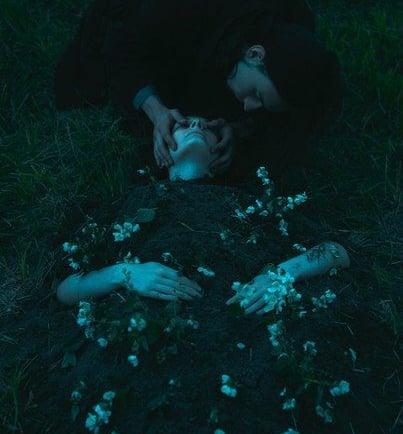Caoineadh na Teanga
On healing the náire, the famine genocide and grief which blocks our flow of Irish.
10/15/20253 min read


For years we resented her. The uselessness of learning a 'dead language; not even spoken anywhere.’ Resented the imposition of being ‘forced to learn’ her. Resented the complexity of her, compared to other simpler Germanic languages, struggling with her subtle sounds and myriad of inflections. Resented the counter productive requirement of her, in a civil service or teaching career; the exclusivity of her, barring us from the inner circles of the Gaeltacht and traditional music.
And then we ignored her. Busy, going, doing, reaching, achieving, forward-looking, outward turning.
And then we used her; for the jobs in Irish language arts and media, for the grants, for the novelty of a secret language while traveling.
And then tháinig réabhlóid anama; an casadh ollmhór (the soul’s revolution, a great turning). The orientation shifted from external to internal and we identified this dull ache within; a feeling that something was missing; some connection that to the real that had become untethered somewhere at sometime, in youth or another lifetime.
And we began to miss her. To desire her, to yearn for her.
And we raked the recesses of our brains for the remenant of learning, of those 12 years of schooling.
And found plenty.
But still we did not speak her. Shyness, yes but something more, embaressment, shame.
Yes, náire, shame, was the cat that had our tongue. So much shame. Shame at what? I asked. ‘The shame of not being able to speak one’s own native tongue,’ they said.
But I believe this shame runs deeper than the obvious and further back than the scoilt ar scoil, the separation at school.
This is shame is so widespread among non-Irish speaking Irish people as to be almost ubiquitous and alludes to a deeper trauma. For though the teanga was initially oppressed by colonists she was later equally suppressed by the colonised.
For if language is memory, then its loss countrywide is mass amnesia. What memory does she carry that we so wish to suppress? What trauma so deep and terrible that our phsyces wished to bury it deep?
The Famine Genocide.
The trauma of burying your entire emaciated family while food is shipped offshore. A horror that would be inconceivable except we have witnessed it repeated in history and this very hour, in Gaza.
And as we witness, in real time, a colonial power starving an occupied nation, creating a famine genocide, some deeply buried memory in our national psyhce is stirred, and we see in those emaciated children of Gaza, our history repeating itself. The geography has shifted, and technology and inter-connectedness now ensures that this genocide cannot be hidden, as the ours was, but the song remains the same.
The repressed memory of the famine genocide, in all of its awfulness, is re-surfacing.
And we are now required to feel that old pain; for the ancestors that couldn’t. For the ancestors who had to comparmentalise their grief to survive, who loped off memories too painful, who opted for the blank slate provided by the English language. And so a partition occurred in our nation’s mind; which was perhaps inevitably followed by a lobotomy of the land and the abscission of its Northern counties.
So we let our teanga go because we wanted to forget what was done to us. Or perhaps more importantly, more grievously, what we permitted to be done to us. For we know now as survivors of trauma (a title perhaps every man and woman on earth can claim in varying degrees) that the shame at the failure to prevent an abuse or the shame at failure to protect ourselves and loved ones from abuse registers more deeply than the physical abuse itself. And so with our ancestors, who not only bore the grief of burying their children and parents who died from starvation, but the awful burden of allowing it to happen.
Systematic traumatisation is a control mechanism of colonisation. We can see it employed today in Gaza; and we can imagine how it was used here in Ireland, 180 years ago. As Milan Kundera said: 'The struggle of people against power is the struggle of memory against forgetting.''
In the Irish revival movement which could as easily be called the remembering or the restoration movement, we must first process the wounds of the past. A beloved child has many names and in our 32 words for field and 99 words for rain was our love articulated and our intimacy with our land evidenced.
Beyond the wall of shame and the deep well of grief, tharr agus faoi, over and under, beyond all that, lies our old love affair, undimmed after all these years.
It requires remembering and this requires a true account of the past. In a meticulously researched book written by Chris Fogarty in 2018, the number of those killed in the famine genocide was estimated to be between four and five million rather than one million, that Irish school books cite.
If Fogarty is right, then the volume of grief to be processed is much greater than we have been led to believe.
We can use the language as a tool and as a destination, it is both a means and an end in this healing journey.
